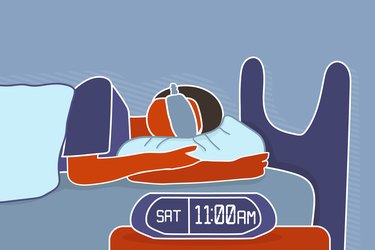
Thanks to planes, you can traverse the U.S. from the Atlantic to Pacific in mere hours and get anywhere in the world in under a day. Just imagine what your ancestors would think of these speedy travels! But there's a downside to rapid transportation: jet lag.
"The ability to travel faster (with jet engines) has resulted in people being able to fly to a place faster than their biology can adjust to the new local time," says Alex Dimitriu, MD, who is double board-certified in psychiatry and sleep medicine and the founder of Menlo Park Psychiatry & Sleep Medicine and BrainfoodMD. "When we walked, or ran, we could not cover so many time zones in so little time," he notes.
Video of the Day
Video of the Day
Flying across time zones sends your circadian rhythm — aka the clock within your body that helps you know when it's time to wake up and go to sleep, among other important physiological tasks — off-kilter. The result: You'll feel groggy and maybe even out of sorts once you arrive at your destination.
Find out what you can do to ward off jet lag, along with treatment tactics that work.
Symptoms of Jet Lag
Your body isn't designed to spin across time zones. So, while you can get from Chicago to Rome in just 10 hours, the experience isn't without consequences.
"People with jet lag experience all of the symptoms of sleep deprivation," Dr. Dimitriu says. Some of the symptoms you may experience include:
- Fatigue
- Impaired focus and productivity
- A bigger appetite along with craving carbs
- A desire to sleep
You may also experience GI issues (sleep and poop are linked, after all) or menstrual changes due to jet lag, says sleep psychologist Samina Ahmed, PsyD, an advisor to Pluto Pillow. And you may feel moody or just generally not yourself and not well, per the Mayo Clinic.
Plus, even after a day craving sleep, once you're in bed, jet lag can cause insomnia, Dr. Dimitriu says.
The good news: Jet lag is temporary, Ahmed says. Here are a few factors that influence how hard you're hit with jet lag:
The Distance You’re Traveling
The more time zones you travel across, the worse it feels, Ahmed says.
"[The] rule of thumb is jet lag typically lasts one to two days for each time zone traveled," Ahmed says.
That means going from Los Angeles to New York — crossing from Pacific to Mountain to Central time before arriving in the Eastern time zone — can lead to a recovery time of up to six days, she says.
The Direction You Travel
"My favorite rule for travel: 'East is beast, and west is best,'" Dr. Dimitriu says.
That is, going from LA to NYC will be more challenging than the reverse direction. Here's why: "For most people, it's easier to stay up an hour later than to go to bed an hour earlier," says Steven Feinsilver, MD, director of the Center for Sleep Medicine at Lenox Hill Hospital.
Go from Chicago to San Francisco, and you'll just need to stay up an extra two hours to get on schedule. But fly the reverse direction, and you'll need to wake up two hours earlier than usual, a scenario that causes groans in most.
Taking a red eye is unlikely to help. "Flying overnight and arriving the next morning does tend to result in greater jet lag," Ahmed says.
Your Age
You know how hangovers feel more wretched with every birthday? Same goes for jet lag.
It's different for everyone, of course (some people get hit harder, while others handle it OK). But as a general rule: "Children are better able to bounce back from it than older adults," Ahmed says.
Bottom line: If you're traveling east, passing through multiple time zones and are older, give yourself plenty of time to recover once you arrive at your destination.
Related Reading
How to Prevent Jet Lag

Jet lag is a major biological event for your body, Dr. Feinsilver says. "You can't fool Mother Nature that well," he adds.
But there are a few tactics you can try before getting on a flight to ease symptoms and help you get over get lag faster once you arrive.
1. Shift When You Go to Bed and Wake Up
Think about the time change between where you are and where you're going, and adjust your bedtime and a.m. alarm clock accordingly before your trip.
"Some people benefit from starting to shift their bed and wake times towards the destination time before leaving," Dr. Dimitriu says.
Ahmed recommends doing this a week before your travel, with 15- to 30-minute-per-day changes to your bed and wake times. Doing this will ease you into the adjustment. (Sleep experts recommend a similar tactic to help you adjust to daylight saving time, by the way.)
2. Take Melatonin or Ask About Sleep Meds
If you need to fall asleep earlier, you can try taking melatonin to change your clock a bit, Dr. Feinsilver says. It's "not perfect but fairly harmless," he says.
In fact, Ahmed says, melatonin works better to help regulate the circadian rhythm than it does to treat insomnia. "A low dose of melatonin (0.5 to 1 milligrams) is more than enough to advance or delay the sleep schedule," she says.
Just keep in mind: Taking a higher dose of this supplement "does not usually result in better or faster results," she says.
Another option: sedative-hypnotic medications, such as Ambien and Lunesta, which help send you to sleep and keep you asleep (or both) . But note these types of medications are not recommended for short travel periods, Ahmed says.
"If you are someone that travels frequently for work and is struggling with sleep and daytime function, then your medical provider may consider the use of hypnotic medication or other sleep aids," Ahmed says.
3. Use Light to Your Advantage
It's not easy to change your sleep patterns. (You're well aware of that if you've had a newborn or just find the one-hour shifts to and from daylight saving time taxing.)
Along with melatonin to let your body know it's time to go to sleep, some other simple tools can be helpful, Ahmed says. These include:
- Light-blocking glasses: They'll reduce your alertness from light exposure if you're going to bed before sunset. Plus, they'll "trigger natural melatonin release," she says.
- Sunlight or bright artificial light: This is what you'll want around your wake-up time. They'll both work to "reduce drowsiness and promote alertness," Ahmed says.
4. Stay Hydrated
When you're not properly hydrated, you won't feel well. So staying hydrated is always a good idea — and, because cabin air can be dehydrating, drinking up (H2O, specifically) is particularly important, per the Mayo Clinic.
Because your goal is to stay hydrated, you're probably best off avoiding alcoholic and caffeinated beverages, as these can both be dehydrating.
Should You Sleep on the Plane?
It might help...but not necessarily. “I don’t know what the best strategy is,” Dr. Feinsilver says.
Keep in mind, he notes, that many people can’t sleep on planes — and nobody really gets a solid rest during a flight, even if they do get some shut-eye.
Plus, even if you’re taking an overnight flight to Europe, you’ll probably only clock around four hours of rest, Dr. Feinsilver says. (You likely won't sleep during takeoff and landing.) That’s not really much time. A longer flight might serve you better — or a daytime flight to Europe, he says. Unfortunately, there aren’t many international flights scheduled during the day, because most people would rather not devote a day to flying.
Per the Mayo Clinic, aim to sleep on the plane if you’re flying when it’s nighttime where you’re going — and stay awake if it’s daytime there.
How to Treat Jet Lag

You'll find that these treatment options to help you get over jet lag mirror the prevention tactics, Ahmed says.
1. Adjust Your Sleep Patterns to Local Time
"Focus on sticking to a consistent sleep routine in the new time zone, regardless of how tired you are," Ahmed says.
That means going to the bed and waking up at reasonable hours for your destination time zone — not where you came from.
Tip
“Consider dark sunglasses in the evening if you are having trouble falling asleep in the local time zone,” Dr. Dimitriu says.
2. Get Light in the A.M.
In general, light is important for helping regulate sleep — that's why you want to block it out at nighttime.
"Ideally, you want to get exposed to light in the morning," Dr. Feinsilver says.
To get over jet lag faster, try going outside and taking a walk first thing, he suggests.
3. Eat on Schedule
"There is also some anecdotal evidence that eating meals at the proper local times may also help you [get over jet lag] sooner," Dr. Dimitriu says.
Do your best to eat when people around you are eating, Dr. Feinsilver says.
And try drinking something caffeinated to perk you up, per the Mayo Clinic. Just keep an eye on when you consume coffee, soda or other sources of caffeine — drinking them in the afternoon can stop you from sleeping soundly in the evening.
4. Try to Get Some Exercise
Getting exercise in the morning can help you wake up, Dr. Feinsilver says. But skip a nighttime workout, because it could keep you up, per the Cleveland Clinic.
5. Take a Nap
If it's really feeling unbearable, try napping to help you get over jet lag.
Just "don't sleep all day," Dr. Feinsilver cautions. Try setting the alarm for 30 minutes — you likely won't sleep for all of it, he notes.
"Then you might wake up feeling more or less refreshed," Dr. Feinsilver says.
You want to avoid napping so long that you can't fall asleep at the local bedtime. Timing matters, too: Don't nap too late in the afternoon.
6. Consider Sticking to Your Home Time
No matter what you do, you'll never feel totally fresh once you arrive in a new time zone.
"Try not to do anything important when you should be asleep," Dr. Feinsilver recommends.
And, in some cases — like a short trip, for example — it can be easiest to just stick with your home schedule, and be a bit off-kilter to the local time zone, he says.
Is this an emergency? If you are experiencing serious medical symptoms, please see the National Library of Medicine’s list of signs you need emergency medical attention or call 911.


